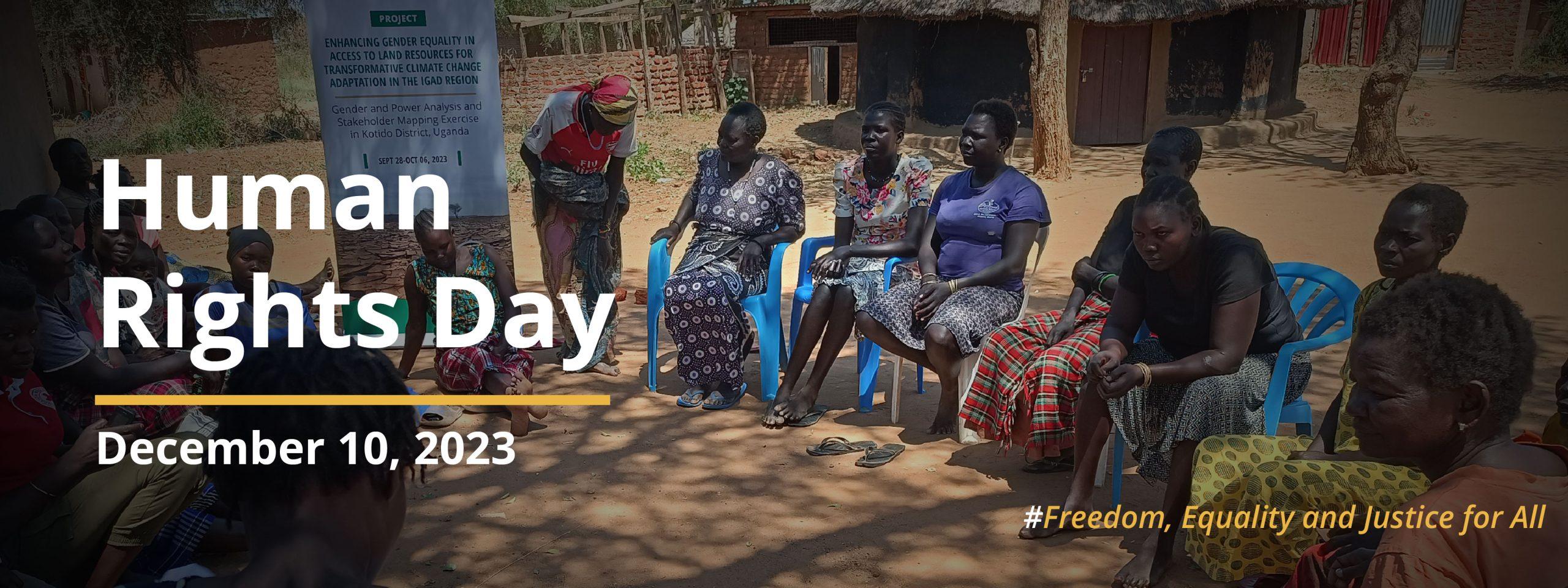IGAD joins the rest of the world in commemorating International Human Rights Day, marking the conclusion of the 16 Days of Activism. This year’s global theme for IHRD, ‘Equality, Freedom, and Justice,’ aligns with IGAD commitments outlined in the IGAD Gender Strategy 2023-2030, along with other frameworks like the IGAD Regional Strategy 2020-2025.
Rural women in the IGAD Region predominantly derive their livelihoods from agriculture and fisheries. However, these crucial sectors face substantial impacts from climate change, disrupting not only production but the entire value chain. IGAD has actively studied the gender perspective within climate change’s influence on agriculture and the Blue economy, propelling the design and implementation of gender transformative interventions.
With support from the African Development Bank/African Climate Change Fund, the Land Governance Programme recently conducted a Gender and Power analysis within the context of climate change. Similarly, a gender analysis related to the Blue economy received backing from the Swedish Government. Both assessments vividly highlight intersectional inequalities exacerbated by climate change, affecting marginalized groups, especially women in fishing communities and rural women involved in farming and trade.
Climate change significantly diminishes surface and groundwater resources, intensifying competition among agriculture, ecosystems, and settlements, thereby impacting rights such as access to water and sanitation, health, life, food, and an adequate standard of living. Women’s rights, particularly, have been infringed due to this crisis, largely influenced by existing social norms and gender roles.
The Fifth Assessment Report (AR5) by the Intergovernmental Panel on Climate Change (IPCC) emphasizes the vulnerability of socially, economically, culturally, and politically marginalized individuals to climate change and its responses. The Convention on the Elimination of all Forms of Discrimination Against Women (CEDAW), as the first explicit global framework on women’s rights, underscores the need to protect rural women from such infringements (Article 14).
Most IGAD member states have ratified CEDAW, committing to eradicating all forms of discrimination against rural women, ensuring gender equality, promoting their participation in rural development, and empowering them in decision-making processes.
At the continental and regional levels, frameworks like the African Union Climate Change and Resilient Development Strategy 2022-2032 and the IGAD Climate Change Strategy and Action Plan 2023-2030 explicitly address climate change as a human rights concern. Despite progress in developing climate-related frameworks, the exclusion of women and marginalized voices in policy and decision-making spaces on climate action perpetuates barriers to inclusive and contextual climate solutions.
In 2023, IGAD received funding from the African Development Bank/Africa Climate Change Fund to implement a project across Djibouti, Kenya, and Uganda. The project aims to promote gender equality in accessing land resources for transformative climate change adaptation, addressing gender inequalities in climate action through policy and programming. A gender and power analysis conducted in these countries revealed the dynamics and inequalities accelerating the climate crisis.
Therefore, it’s crucial for all programs and projects to intentionally integrate gender perspectives into climate action. This integration ensures that adopted solutions address the root causes of women’s inequalities, fostering a just transition amidst the climate crisis.”
Written by:
Joselyn Bigirwa
Gender and Land Expert and Gender focal point,
IGAD Agriculture and Environment Division.

